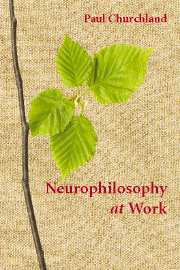Book contents
- Frontmatter
- Contents
- Preface
- Provenances
- 1 Catching Consciousness in a Recurrent Net
- 2 Functionalism at Forty: A Critical Retrospective
- 3 Toward a Cognitive Neurobiology of the Moral Virtues
- 4 Rules, Know-How, and the Future of Moral Cognition
- 5 Science, Religion, and American Educational Policy
- 6 What Happens to Reliabilism When It Is Liberated from the Propositional Attitudes?
- 7 On the Nature of Intelligence: Turing, Church, von Neumann, and the Brain
- 8 Neurosemantics: On the Mapping of Minds and the Portrayal of Worlds
- 9 Chimerical Colors: Some Phenomenological Predictions from Cognitive Neuroscience
- 10 On the Reality (and Diversity) of Objective Colors: How Color-Qualia Space Is a Map of Reflectance-Profile Space
- 11 Into the Brain: Where Philosophy Should Go from Here
- Bibliography
- Index
7 - On the Nature of Intelligence: Turing, Church, von Neumann, and the Brain
Published online by Cambridge University Press: 24 July 2009
- Frontmatter
- Contents
- Preface
- Provenances
- 1 Catching Consciousness in a Recurrent Net
- 2 Functionalism at Forty: A Critical Retrospective
- 3 Toward a Cognitive Neurobiology of the Moral Virtues
- 4 Rules, Know-How, and the Future of Moral Cognition
- 5 Science, Religion, and American Educational Policy
- 6 What Happens to Reliabilism When It Is Liberated from the Propositional Attitudes?
- 7 On the Nature of Intelligence: Turing, Church, von Neumann, and the Brain
- 8 Neurosemantics: On the Mapping of Minds and the Portrayal of Worlds
- 9 Chimerical Colors: Some Phenomenological Predictions from Cognitive Neuroscience
- 10 On the Reality (and Diversity) of Objective Colors: How Color-Qualia Space Is a Map of Reflectance-Profile Space
- 11 Into the Brain: Where Philosophy Should Go from Here
- Bibliography
- Index
Summary
Abstract: Alan Turing is the consensus patron saint of the classical research program in AI, and his behavioral test for the possession of conscious intelligence has become his principal legacy in the mind of the academic public. Both takes are mistakes. That test is a dialectical throwaway line even for Turing himself, a tertiary gesture aimed at softening the intellectual resistance to a research program which, in his hands, possessed real substance, both mathematical and theoretical. The wrangling over his celebrated test has deflected attention away from those more substantial achievements, and away from the enduring obligation to construct a substantive theory of what conscious intelligence really is, as opposed to an epistemological account of how to tell when you are confronting an instance of it. This essay explores Turing's substantive research program on the former topic, and argues that the classical AI program is not its best expression, nor even the expression intended by Turing. It then attempts to put the famous Test into its proper, and much reduced, perspective.
The Classical Approach: Its Historical Background
Alan Turing wanted to know, as we all want to know, what conscious intelligence is. An obvious place to start one's inquiry is the presumptive and prototypical instance of the target phenomenon – normal humans – and the endlessly clever and appropriate behaviors they display in response to the endlessly various perceptual circumstances they encounter.
- Type
- Chapter
- Information
- Neurophilosophy at Work , pp. 113 - 125Publisher: Cambridge University PressPrint publication year: 2007
- 1
- Cited by



